- Home
- Anne O'Brien
Devil's Consort
Devil's Consort Read online
Devil’s
Consort
ANNE
O’BRIEN
www.mirabooks.co.uk
About the Author
ANNE O’BRIEN taught History in the East Riding of Yorkshire before deciding to fulfil an ambition to write historical fiction. She now lives in an eighteenth century timbered cottage with her husband in the Welsh Marches, a wild, beautiful place renowned for its black and white timbered houses, ruined castles and priories and magnificent churches. Steeped in history, famous people and bloody deeds, as well as ghosts and folklore, the Marches provide inspiration for her interest in medieval England.
Visit her at www.anneobrienbooks.com
About the Author
ANNE O’BRIEN taught History in the East Riding of Yorkshire before deciding to fulfil an ambition to write historical fiction. She now lives in an eighteenth century timbered cottage with her husband in the Welsh Marches, a wild, beautiful place renowned for its black and white timbered houses, ruined castles and priories and magnificent churches. Steeped in history, famous people and bloody deeds, as well as ghosts and folklore, the Marches provide inspiration for her interest in medieval England.
Visit her at www.anneobrienbooks.com
Also by
ANNE
O’BRIEN
VIRGIN WIDOW
For George, as ever, with love.
And for my father, who gave me my first
love of history.
If all the world were mine From the seashore to the Rhine,
That price were not too high
To have England’s Queen lie
Close in my arms.
—Anonymous German troubadour
An incomparable woman … whose ability was the admiration of her age.
Many know what I wish none of us had known.
This same Queen in the time of her first husband went to Jerusalem.
Let no one say any more about it …
Be silent!
—Richard of Devizes
ACKNOWLEDGEMENTS:
All my thanks to my agent, Jane Judd,
who continues to be enthusiastic about
my versions of medieval history.
And to Helen and all her experts at Orphans Press,
who make my hand-drawn maps and
genealogy look splendidly professional.
ACKNOWLEDGEMENTS:
All my thanks to my agent, Jane Judd,
who continues to be enthusiastic about
my versions of medieval history.
And to Helen and all her experts at Orphans Press,
who make my hand-drawn maps and
genealogy look splendidly professional.
CHAPTER ONE
July, 1137:
The Ombrière Palace, Bordeaux.
‘WELL, he’s come. Or at least his entourage has—I can’t see the royal banners. Aren’t you excited? What do you hope for?’
Aelith, my sister, younger than I by two years and still with the enthusiasms of a child beneath her newly developing curves, battered at me with comment and questions.
‘What I hope for is irrelevant.’ I studied the busy scene.
I had got Louis Capet whether I liked it or not.
I had thought about nothing else since my father’s deathbed decision to place me under the hand of Fat Louis—the King of France, no less—had settled my future beyond dispute. I wasn’t sure what I thought about it. Anxiety at the choice vied with a strange excitement. Queen of France? It had a weighty feel to it. I was not averse to it, although Aquitaine was far more influential than that upstart northern kingdom. I would be Duchess of Aquitaine and Queen of France. I need not inform my newly espoused husband which of the two I considered to be the more important. Although why not? Perhaps I would. I would not be disregarded in this marriage.
I was Eleanor, daughter and heir to William, the tenth Duke of Aquitaine, the eldest of my father’s children, although not born to rule. Not that I, a woman, was barred by law from the honour, unlike in the barbaric kingdom of the Franks to the north, but once I had had a younger brother who had been destined to wear the ducal coronet. He, William—every first-born son was called William—was carried off by a nameless fever, the same as relieved my mother Aenor of her timorous hold on life. Leaving me. In the seven years since then I had grown used to the idea. It was my right to rule.
But I was nervous. I did not think I had ever been nervous before: I had had no need, as my father’s heir. My lands were vast, wealthy, well governed. I had been brought up to know luxury, sophistication, the delights of music and art. I was powerful and—so they said—beautiful. As if reading my mind, my troubadour Bernart began to sing a popular verse.
He who sees her lead the dance, sees her body twist and twirl,
Can see that, in all the world, for beauty there’s no equal
Of the Queen of Joy.
I smiled. The Queen of Joy indeed. My looking glass confirmed what could be mere flattery, the greasy, self-seeking compliments of a penniless minstrel towards his patroness. But I was not ingenuous. Alone, unprotected, unwed, there would be a limit to my powers. I needed a husband with a strong sword arm, and powerful loins to get an heir on me—for him and for myself. A puissant lord who would stand with me and secure the future for Aquitaine, a man who could lead men and demand the obedience of the power-hungry lords who would snatch what was mine. A man who would be a fit mate for such as I.
Ah, but would Prince Louis fit this mould?
‘Well?’ Aelith nudged me.
‘What do I hope for? A prince, of course,’ I replied.
‘That’s no answer.’
‘A man after my own heart.’
‘Self-important?’ Leaning against the carved window ledge, Aelith ticked them off on her fingers. ‘Opinionated? Arrogant?’
But I sidestepped my sister’s chuckling malice and answered seriously enough. ‘Why not? He will rule my lands. He must do it well. He’ll not do it if he has neither the backbone nor the spirit for it. Better a man with arrogance than one who’d sell himself short to make friends. My vassals need a firm hand.’
We were standing in my bedchamber, Aelith, my women and I, high in the old keep, a spacious, graceful room with large windows to catch the light and any breath of air on this day of impossible heat. A room that I loved, full of my own possessions, and from where I could look out across the Garonne to observe the whole scene unfold hour by hour. It was July, hot as the gates of hell, and I was restless with impatience as Aelith and I observed the settlement grow. Tents, pavilions, sprouting like mushrooms, covered the open meadows, transforming them into a town in its own right. A vivid, richly-coloured Capetian town on Aquitaine soil. A foreign presence, and above it all the fleurs de lys of France. A portent for the future, I acknowledged, a French symbol of ownership over the mighty Duchy of Aquitaine. Before me, horses and armed men swarmed. Farriers and wheelwrights set up their booths and a market was soon under way. Small boats plied back and forth with Frankish noblemen or mounds of cabbages. My vassals, I was well aware, would question the relative importance of the two. It would not be a popular marriage but we would all have to live with it.
‘He must be handsome, of course,’ Aelith announced. She was already precociously aware of the male sex.
‘Of course.’ I had no thought of a husband who was less than pleasing to the eye.
‘Like Raymond.’ Aelith sighed a little.
Raymond of Poitiers, my father’s young brother, now ruling as Prince of Antioch in distant Outremer.
‘Yes. Like Raymond,’ I agreed. My only meeting with Raymond had been of the briefest, four years ago now and for a mere few weeks, but my memory of his golden beauty had not faded with time. Raymond
was to my mind the epitome of the perfect knight. ‘If the French prince is in any measure like Raymond, I shall be everlastingly grateful.’ My attention was caught by a flurry of movement across the river. ‘Look! That’s the royal standard!’ I pointed. Aelith leaned to see the blue pennants with the gold lilies of France. ‘So Prince Louis is here at last.’
‘As long as he’s prettier than Fat Louis,’ she remarked.
‘I’ll give you my gold circlet if he’s not. Fat Louis is naught but a mountain of lard ridden with dysentery.’
But I knew better than to underestimate King Louis. His body might be corrupt but his mind was still keen. He might be too corpulent to rise from his bed, too obese to mount either a horse or a woman, so rumour said, but he had seen me as a gift dropped from heaven into his enormous lap.
We watched as another pavilion was erected, larger than all the rest. The Capetian banner was planted beside it to hang limply in the windless air. A group of horsemen drew up and dismounted. Impossible to make out one figure from the next at this distance.
‘They won’t like it, you know.’ I spoke softly. ‘My vassals will detest it.’
‘But they have no choice.’ Aelith pursed her lips. ‘And if the Prince keeps the brigands from our doors, they’ve no right to complain.’
True in essence, but far too simplistic.
Was this, this Frankish marriage, what the Duke my father had intended when he had placed me into King Louis’s keeping? Arrange a marriage for my daughter, he had left instructions for Louis as his life drained from him on the pilgrim’s road to Santiago de Compostela in Spain. And do it fast, before rebellion can take hold. Until that time, I give her and Aquitaine into French safe hands.
What was my father, Duke William the Tenth of Aquitaine, thinking? Surely he’d understood that King Louis would never allow me to escape from his fat fingers. It would be like expecting a fox to show goodwill by keeping out of the hen coop even though the door was left invitingly open, and the King of France was no kindly fox. Arrange a fast marriage for me? By God, he had. Between the vomit and the bloody flux that tied him to his bed, Fat Louis had moved heaven and earth to secure me for his son before anyone could voice a protest.
And there had been plenty. My father’s vassals may have sworn an oath of homage to me in his lifetime, but our lands were torn by unrest. The Count of Angoulême, a vassal lord of Aquitaine, was vicious in his condemnation and was not alone. They would have accepted someone like Raymond, one of their own. They would have just about tolerated a noble lord of the south who might win my hand. But not this Capetian interloper, this foreign northerner from some insignificant Frankish tribe. I knew what they would be thinking as they too watched this impressive arrival. They would see Louis Capet as a foreign power who would drain us to further his own ambitions. My father may have insisted with his final breath that Aquitaine remain independent from France, ruled separately, to be inherited in some distant future by the heir of my own body; he might have insisted that Aquitaine must not be absorbed into French territory, but how many of my vassals would remember that, when faced with this invasion of unveiled power?
‘It might have been more politic—’ I spoke my thoughts ‘—if my father had not thrown us into the hands of a Frank.’
And I marvelled at my father’s unwarranted stupidity in drinking water fouled by a horde of pilgrims, all of whom had doubtless washed and spat and pissed in its shallows. Did he not see, scooping up the bad fish, gulping the rank water, his mind taken up with the successful culmination of his pilgrimage? All he got was a night of fever, of vomiting and flux, rapidly followed by a pain-racked death before Saint James’s altar.
An excess of piety can make us all stupid.
‘Perhaps the vomiting addled his brain,’ remarked Aelith dryly.
And perhaps the outcome would be civil war. It might be like setting a brand to dry timber, insurrection sweeping through Aquitaine and Poitou before we had finished dancing at my marriage feast.
A quick wash of fear replaced the nerves and the anticipation.
Behind me the troubadour, obviously listening in, struck a strident note on a lute so that I turned to look, seeing the lifting of his brow in my direction. When I smiled in appreciation of his intent, Bernart began to sing a popular if scurrilous verse in a soft growl.
Your Frank shows mercy, just to those who can pay him,
There’s no other argument ever can sway him …
He hesitated, breath held, fingers lifted from the strings, to assess my reaction, and even though I knew what would come next, I waved him on. Bernart struck another heavy chord.
He lives in abundance, his table’s a feast,
But you mark my words, he’s a treacherous beast.
My women joined in with relish in the last line. The Franks were not well loved. A coarse, aggressive, unpolished people, compared with our Roman sophistication in Aquitaine.
‘Enough!’ I moved into their midst. ‘We’ll not be discourteous.’
‘No, lady.’ Bernart bowed over his beloved lute. ‘We’ll make our own judgement when the Prince becomes Duke of Aquitaine.’
I frowned at the smooth cynicism but could find no fault with so obvious a statement.
‘It’s an honour that he should come to you.’ Aelith still leaned her arms along the sill, unwilling to abandon the entertainment without. ‘Travelling all this way from Paris, in this heat. They say he travelled at night.’
It was true. Everything had been settled with such speed, as if the King of France had the hounds of hell baying at his heels, although what Prince Louis thought of it I had no idea. Perhaps he would have preferred a Frankish bride. I lifted my chin. I too could be cynical.
‘The Prince only came to me because his father the King instructed him to do so. Fat Louis and my guardian the Archbishop feared that if I set foot outside this palace I would be abducted by some scruffy knight with an eye to a rich wife. I’m far too valuable to be allowed to travel the breadth of the country.’ Impatience tightened its grip, now that the Prince was in my sights. ‘How long do I have to wait before I can see him?’
Aelith laughed, a pert toss of her head. ‘At least he’s old enough to play the man and not so old as to be near his grave.’
‘He’s two years older than I.’
‘Old enough to keep you in line?’
‘No.’ I didn’t like this line of humour. ‘I’ll not be a vessel merely to bequeath my royal Aquitaine blood to my children. I am no brood mare, without opinion or wit, to slave and carry at the behest of a husband. I’ll rule my own lands. The Prince must accept that.’
‘But can you protect them, lady?’ Bernart asked with grave familiarity.
Before I could reply, the Archbishop of Bordeaux, Geoffrey of Lauroux, my kindly guardian since my father’s death, was announced and entered. Resplendent in clerical robes despite the heat, he bowed, puffing from the effort of climbing the stairs.
‘Lady. The Prince is come.’
And I knew immediately what I wanted. ‘I would go out and meet with him.’
‘No.’
I thought I had misheard. ‘I wish to see the Prince. Will you arrange it, sir?’
‘Regretfully, no, lady. You will wait here.’
‘But I wish it.’ I would not be thwarted in this.
But the Archbishop remained adamant. ‘To arrive before your future husband, windblown and hot, in the middle of a camp of soldiers and the usual rabble of camp followers? Less than perfect, my dear Eleanor. I think not. You will wait here. You will allow Prince Louis to come to you. As he should, of course.’ The Archbishop’s eyes twinkled with crafty appeal to my pride. ‘The Kingdom of France cannot compare with the Duchy of Aquitaine. You will stand on your dignity. You will control your impatience.’
Dignity. Control. Maturity was rushing up to meet me, so fast that it took my breath. And I knew it must be so. The days of my wilful girlhood were gone for ever.
‘How long must
I wait?’
‘Not long. Tomorrow I will bring him to you.’
Another whole day. But to ride into the Capetian camp, as any common sightseer to peer and pry … No. I would not do that.
‘Tomorrow then. We will hold an audience in the Great Chamber.’
‘I will arrange it.’ The Archbishop bowed again and departed, well satisfied, as was I.
I went back to the window, straining to see if I could make out the distant figure of my future husband. I could not, of course. My gaze strayed to the nearer, familiar vista of Bordeaux. My days here were now numbered. I would have to leave all this, my well-loved home, the dry, sun-baked south. I had known Bordeaux all my life, the warm, golden walls enclosing vineyards and gardens as well as our own ducal palace. Churches with their spires arrowing to heaven. The market and port with ships landing goods from all the known world. Paris? What did I know of it? Very little, I admitted. Landlocked. Cold and damp and northern. Whatever it was, it was about to become the centre of my new life.
‘And have you decided which language you’ll use to address your most puissant Prince?’ Aelith murmured, coming up to tuck her hand through my arm. She was definitely in the mood to annoy.
‘I shall speak my own language, of course.’
‘You’ll not make it easy for him?’
‘Why should I? He’ll gain far more from this marriage than I. Our new combined kingdom …’
‘Never mind the politics, sister. You’re too solemn. Far more important—what will you wear to meet him for the first time?’
‘Aelith! Life’s not all about dresses and mantles …’
‘Sometimes it is. Which reminds me, will you lend me your pleated undergown—the blue silk patterned with silver?’
‘No.’ It was new and precious.

 The Queen's Rival
The Queen's Rival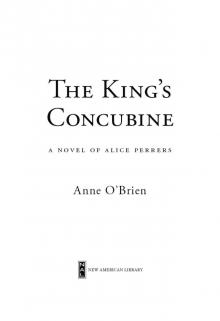 The King’s Concubine: A Novel of Alice Perrers
The King’s Concubine: A Novel of Alice Perrers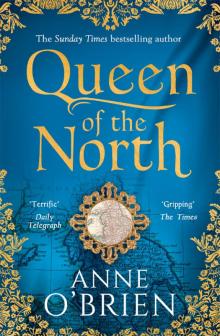 Queen of the North
Queen of the North The Scandalous Duchess
The Scandalous Duchess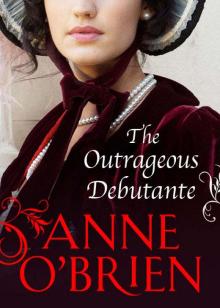 The Outrageous Debutante
The Outrageous Debutante The Forbidden Queen
The Forbidden Queen The Runaway Heiress
The Runaway Heiress Devil's Consort
Devil's Consort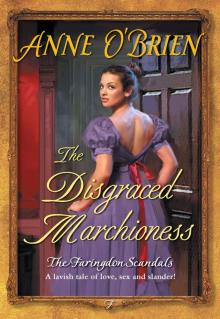 The Disgraced Marchioness
The Disgraced Marchioness Chosen for the Marriage Bed
Chosen for the Marriage Bed Puritan Bride
Puritan Bride Battle-Torn Bride
Battle-Torn Bride Conquering Knight,Captive Lady
Conquering Knight,Captive Lady The Shadow Queen
The Shadow Queen Virgin Widow
Virgin Widow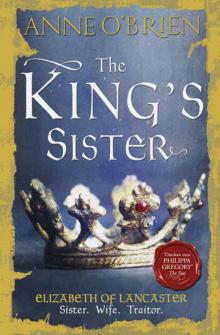 The King’s Sister
The King’s Sister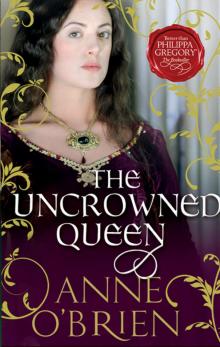 The Uncrowned Queen
The Uncrowned Queen The Queen's Choice
The Queen's Choice